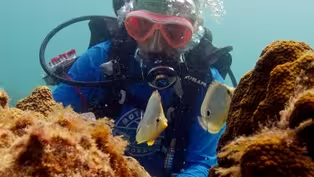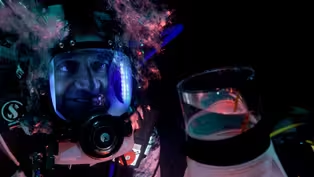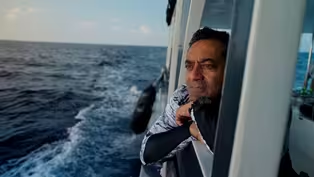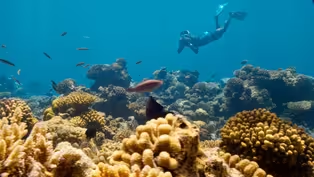
Reef Nursery Symphony: Soundscaping for Coral Restoration
Clip: Season 3 Episode 1 | 4m 36sVideo has Closed Captions
The innovative mission to restore coral reefs with a groundbreaking musical twist.
Professor Steve Simpson from Bristol University, UK, plays the sounds of a healthy reef to baby coral nurseries. These sounds will later guide the coral to settle in ideal locations. This innovative approach, on an industrial scale, marks a giant leap toward coral reef restoration, blending science, engineering, natural history, and conservation on a grand scale.
Problems playing video? | Closed Captioning Feedback
Problems playing video? | Closed Captioning Feedback

Reef Nursery Symphony: Soundscaping for Coral Restoration
Clip: Season 3 Episode 1 | 4m 36sVideo has Closed Captions
Professor Steve Simpson from Bristol University, UK, plays the sounds of a healthy reef to baby coral nurseries. These sounds will later guide the coral to settle in ideal locations. This innovative approach, on an industrial scale, marks a giant leap toward coral reef restoration, blending science, engineering, natural history, and conservation on a grand scale.
Problems playing video? | Closed Captioning Feedback
How to Watch Changing Planet
Changing Planet is available to stream on pbs.org and the free PBS App, available on iPhone, Apple TV, Android TV, Android smartphones, Amazon Fire TV, Amazon Fire Tablet, Roku, Samsung Smart TV, and Vizio.
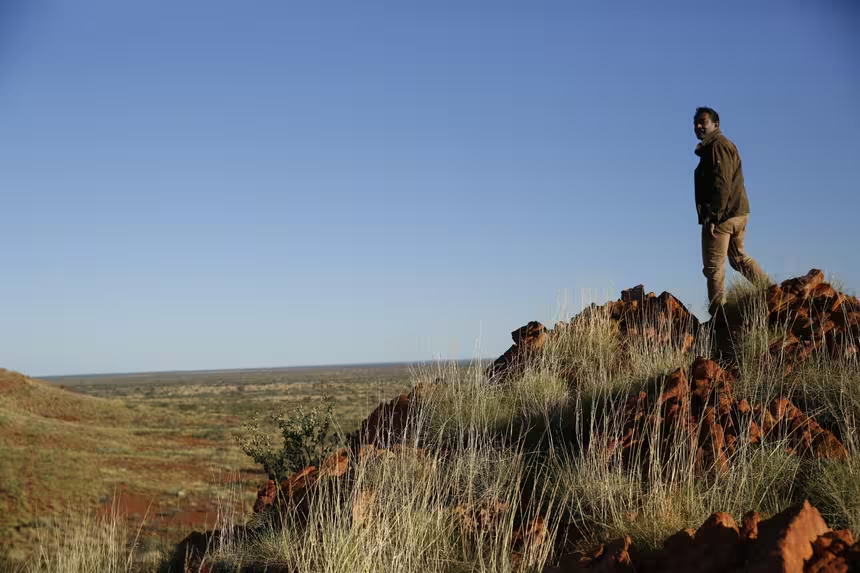
Dr. M. Sanjayan On Our Climate Future
Dr. M. Sanjayan discusses how he stays optimistic about our climate future, our role in climate change, his climate heroes, and more.Providing Support for PBS.org
Learn Moreabout PBS online sponsorshipBack in the Maldives.
Our next step is to create a safe place for the developing embryos to grow for a few days before being put out onto the damaged Olhuveli Reef.
We set up inflatable pools to act like coral nurseries made from netting that has holes small enough to keep the spawn in, but large enough for water to flow through.
“So what we need to do now is transfer ” “the embryos ” “we've got in those cultures which are going well.
” “Corals are really sensitive.
” “Their eggs and sperm react really badly to changes ” “in the environment, ” “so we need to protect them as much as possible ” “during this critical early high ” “floating stage at the surface of the water.
” “So what we're going to do now is inflate ” “these pools that we've developed ” “and then we're going to pop a net inside the pool ” “and then we're going to tow ” “these over and anchor them nearby, ” “and then we're going to transfer those embryos ” “across into the pool ” “and hope ” “we don't get torrential rain, in the next 12 hours.
” “A bit of trial and error, but it mostly worked well, ” “from the beginning.
” “What I love about being ” “here in coral, frankly, coral science, is that it's ” “so cutting edge, It's so new in some ways ” “that everything you're seeing, ” “you're seeing for the first time ” “kind of ever.
” “Every step has such massive chance of failure.
” “Like, if it rains, it's done.
” “This pool doesn't blow up.
” “We're done.
” In another world first, this coral nursery is going to hear a soundtrack.
Steve is going to play the sounds of a healthy reef to the baby coral that he will later use to attract them back to the degraded reef.
“...and then convince them to go down ” “and settle into these places ” “where they've got a great chance of survival, ” “but they'd never find it.
” “In the lab you've shown this.
” “Yeah.
” “So this is basically trying to replicate it, ” “but with a very ” “large chamber in the open ocean ” “This is an industrial scale.
” “This is taking it up to the scale ” “that we would need it to be ” “to be able to really restore coral reefs.
” “That's what I love.
Like it's innovation every ” “step of the way.
” “It's science, it's engineering, ” “it's natural history, and it's conservation ” “and restoration at a grand scale.
” “Its that hive mind, isnt it ” “Exactly ” “what you need to solve, things like climate change, right?
” “It's never going to ” “be solved by one thing with one discipline.
” “It's got to be cross-disciplinary, ” “and I think that is what is so cool about this.
” “Down, down, down, down, down.
” “Okay.
” “Take it across and pop it in the middle.
” “Fantastic.
” The reef restoration will be an ongoing process.
Peter is going to leave the nursery pool here and train the local team how to use it for future spawning events.
“Yeah.
” “Give it a little push.
” “Nicely done.
” “Ready to rock!
” “Now, one more critical step, which is ” “how do you get this spawn, which is in giant buckets here ” “into the contraption?
” “One slip and it goes over in the ocean, ” “and the experiment is done for at least a month, if not more.
” “Steady, steady, steady.
” “Okay, you ready?
” “Careful!
Yep.
” “Ready.
” “Keep it even.
” “Keep it even.
Right.
” “...and now, gently pour it in.
” “Whoohoo!
” “Babies!
”
Battling Coral Disease: Treatments Below the Waves
Video has Closed Captions
Clip: S3 Ep1 | 3m 19s | Discover the non-antibiotic solutions used to combat stony coral tissue loss disease. (3m 19s)
Capturing Life's Genesis: Coral Spawn Collection
Video has Closed Captions
Clip: S3 Ep1 | 3m 52s | M. Sanjayan witnesses the ingenious net capturing of coral spawn. (3m 52s)
Video has Closed Captions
Preview: S3 Ep1 | 3m 8s | Dr M. Sanjayan investigates the urgent efforts to help coral reefs survive climate change. (3m 8s)
Floaty Boat: Precise Delivery for Coral Larvae
Video has Closed Captions
Clip: S3 Ep1 | 4m 49s | Meet Floaty Boat, the high-tech vessel ensuring precise coral larvae restoration. (4m 49s)
Video has Closed Captions
Preview: S3 Ep1 | 30s | Dr M. Sanjayan investigates the urgent efforts to help coral reefs survive climate change. (30s)
Providing Support for PBS.org
Learn Moreabout PBS online sponsorship
- Science and Nature

Explore scientific discoveries on television's most acclaimed science documentary series.

- Science and Nature

Capturing the splendor of the natural world, from the African plains to the Antarctic ice.












Support for PBS provided by:
